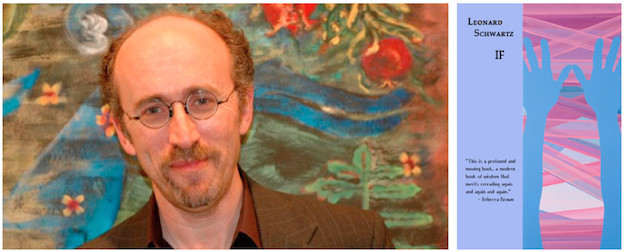Vagabond imagination
A review of Leonard Schwartz's 'If'

If
If
In the fifteenth century, François Villon claimed the subjunctive mood for his vagabond verse with Si j’etais roi. In his book-length poem If, Leonard Schwartz returns to this conditional world of the subjunctive with a series of wise, vivid, and vulnerable questions, which the poet poses and then leaves unanswered — at least, apparently. More so than most poems, If invites readers to participate actively in its seemingly hypothetical world, underscored by the poet’s frequent invocation of we, our collective selves. In this deeply philosophical work, ontology and epistemology are made as human as hope and fear, and as necessary as wheelbarrows.
The key to If is that the poet posits p, but not q; the ifs of this poem stand alone, without corollary, waiting for the reader’s response, although hints are generously given. Through a terrain populated with possibility, the poet “rambles,” as James Wood termed the stream of consciousness in Shakespeare. The reader joins the poet in a passage through an oneiric, yet familiar landscape, like Richard Wilbur’s Walking to Sleep, encountering language, objects, and their philosophy in the terrain. From section 5:
If a bulldozer lurks in every
Innovation
And the alphabet remains unchanged
For thousands of years
If the warming flesh of rhetoric is
Cut away and the spiritual
Bone structure underneath
Is, surprise, neither warm nor fleshy
What do these unanswered ifs imply? Despite no then statements, the poem’s conditional statements have a sense of completeness to them, accentuated by Schwartz’s occasional use of periods to close a sequence. These if statements assert their integrity and independence, claiming no consequences and all possible sequellae at once. But often, as in a koan, the answer is the question.
If what is said
Is what is sad
If we are signs without interpretation
And what is contemporary in me
Is the sun, the moon, and the stars
Our existence at an inner distance
The poet marks his interlocutions by calling on a “community of persons / Born in the same instant.” If calls to the reader to participate in its collective unconsciousness, which it brings to consciousness through objectivist images of alphabets, stars, and bone. The conditional mood in If takes on the reality of the true self of the individual and her community, looking beyond words through words for their noumenon. The poet’s ding an sich of the concrete examines his own observations throughout the poem, and seems to need the collective’s input for answers.
In the poem, the reader encounters the quotidian as after samadhi, when one continues to chop wood and carry water as before, but now chopped and carried in enlightenment.
If there are windows in mirrors
And mirrors in windows
Sometimes it is an ecstatic response
The unconscious offers to what is observed
As in samadhi or the collective unconsciousness, there is a timelessness to Schwartz’s subjunctive. In the conditional mood of the poem, we are often startled to find ourselves in the past, the present, and a yet-to-be-created future, often simultaneously. Like time-space, the poem curves upon itself: each new thing carries its “bulldozer,” the seeds of its destruction and rebirth, and each if posited refers to previous and next ones.
Language and perception and their confluence are both barriers and gateways for the poet, who is preoccupied by signifiers and memes; there is a search throughout the poem for the ineffable essence that lies behind or just beyond them. If examines semiotics, returning often to the question of what we are beyond symbols and representation, and what symbols and representation make of us. Word play is abundant in the poem and is used to further these themes. As in Joseph Brodsky’s poem New Life, Schwartz’s alphabet assembles itself into objects, hymns, people, and the pursuit of meaning in the text.
Neither mirror nor window
Neither Narcissus nor perception
The poem is built around pauses, and Schwartz’s majusculation chisels the elegant line breaks, allowing the if-without-then statements to be heard clearly in the reader’s mind. Stanza breaks further encourage contemplation of this philosophical work. There is also poetic unity to the poem’s sections and the work as a whole, bound together by this yearning, searching, and recognition of self and other as we. The reader walks to sleep with imagery as striking as in Wilbur’s poem, but from a voice less martial and detached:
If it is mostly in mist that
Losing the “I” yields up a “You”
If frail sleep barely withstands
Waking’s brawn
If rubbing words together does kindle a voice …
One knows one will never free oneself
From the web of daydream …
There is a kindness to If’sbroad worldview that appeals to the soul. Perhaps Psyche’s favorite word, the syllable she loves best, is this one of imagination, possibility, and quest, the syllable of If.